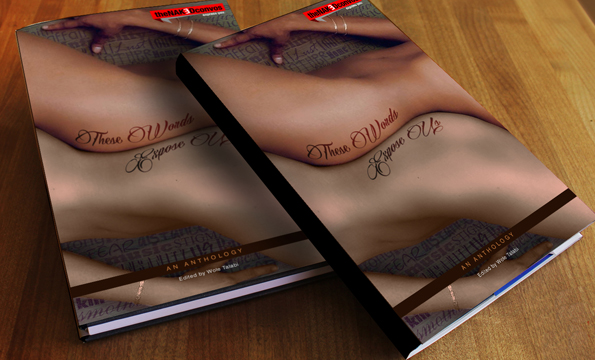Features
BN Book Review: These Words Expose Us: An Anthology by The Naked Convos | Review by Atoke
 Words: those little things that give life to our feelings, our depth and our identities. Words are what tie this eclectic anthology together. The title These Words Expose Us: An Anthology gives one a sense of the expectation of an emotional strip down; and indeed, the book does that.
Words: those little things that give life to our feelings, our depth and our identities. Words are what tie this eclectic anthology together. The title These Words Expose Us: An Anthology gives one a sense of the expectation of an emotional strip down; and indeed, the book does that.
16 stories, 13 writers, this anthology was curated by Wole Talabi – an editor of The Naked Convos – a place where young people are given a safe space for expression in all media. These Words Expose Us, can easily be finished in one day if you put your heart to it. Or the stories can be read one a day and last two weeks if you prefer it that way.
The book starts with The Thing With Mr. Lawal, by ‘Pemi Aguda. As I am a huge fan of ‘Pemi’s work, I am not surprised that I enjoyed reading this story through the eyes of a reviewer. Telling the story from the 2nd person narrative gives the reader a deep sense that the writer is talking directly to you. This style of narrative, not commonly employed, is very enjoyable because it feels like holes are being bored into the reader’s soul. You. You. You. The Thing with Mr. Lawal is a story of love, infatuation and attraction, told in a slow layering of characterization. It’s not a plot driven story and its highest selling point is the slow unravelling of Mr. Lawal. Pemi has two stories in the book, the second being ‘Naming’ which is similarly toned.
The decision to have Business as the second story seemed spot on. Uche Okonkwo’s style of story telling is quite special. ‘Business’ takes you into the life of a female commercial sex worker – ‘Bee’ and one of her unique clients. With clear and concise language and narration, the reader there’s a certain tug emotion for the Bee. I like the fact that she’s ‘unnamed’ – this adds to the allure and secrecy that comes with a University student who has an ‘unsavoury’ night job.
The editor’s own major story contribution, A Certain Sort of Warm Magic was a delightful surprise. Having read Wole Talabi’s work in the past, I was expecting some sci-fi, some fantasy and a dash of supernatural. This was A LOVE STORY, WITH NO MAGIC OR INTERGALACTIC STARDUST. It was simply a story of a man who was afraid to confront his feelings. I had to go back to check that the story was written by Wole.
After a few dictionary checks for some unfamiliar words, I started to think ‘Maybe it is Wole after all’. While the story itself did nothing for my literary, story loving spirits – it had all the trappings of a love tale: lonely man looking into the horizon, meets fly girl in bar, gets her number on the napkin (yes… very filmic, I know) they date, he is stupid enough not to love her back, he loses her, they break up. Wole goes on to inject Hollywood meets Nollywood in these types of stories – insert terminalesque disease. (It’s okay to make up words!). But in writing this simple story, Wole Talabi consistently highlights that universal human characteristic that makes us go through life wondering if we’re fitting properly into the box of definitions with sentences such as:
“I suppose I would have become a professional surfer or a lifeguard if those were acceptable things for young Nigerian man to do with his best years and if I wasn’t so scared of drowning.”
Many of the stories in this anthology do this. They take snippets of everyday life and blow them up. We see our triumphs and our failings, our losses and our gains. We see the fragility of humanity behind the cloak of societal expectations.
There, I Said It by Wale Adetula is brilliant. I finished the book last week, but I have gone back to read this story like 25 times. While it’s not my favourite story in the book (No, we’re coming to that). It’s flash fiction on steroids.
Edwin Okolo‘s The Ballad of Mulikat, is told from the point of view of Kevwe and shows a day in her life as a Lagos street trader. The importance of Mulikat to the plot is not very defined and I wanted to see more of her, either directly or through her relation with the narrator. It didn’t happen till the very end and by the time it did I was already tired. The story was rather long.
As much as I laud the attempt to maintain authenticity of the settings, there were a lot of expressions/phrases in the story that can only be understood by a Nigerian who lives in Nigeria. While that might seem very petty, it is important that stories should be well told and narrated in their proper context in order to cross borders. The first time the word ‘container’ came up I didn’t think of a ‘freight container’, thus I was surprised that human beings were spilling out of it.
The next 6 stories take the book to an entire new height of discovery with different characters. Sometimes, the point of view of the narrator shifted quickly in some of the stories, but overall, the momentum of the stories were good.
When a writer spins you into the fabric of her story and you find yourself asking the question “Am I who I know I am? Or am I who I’m told I am”, then you know that the writer has done a good job. This was me, after reading Osemhen Akhibi’s Orange Tree. Exploring the themes of seeds, roots, Osemhen weaves the story of a woman whose identity is tied to a tree planted in her homestead. The troubled relationship with her mother, was a good string to keep the story moving. It was also a great way to ensure that the tension was amped to the peak at the very end.
The Affair by Marilyn Eshikena is the story of two people, having an affair for 20 years OF NO SEX. They meet for a few hours every year to hold hands and sing Kumbayah! Well, I made the singing bit up but that’s how I felt about the believability of that plot.
I will confess that 3 of the stories didn’t do very much for my pleasant reading experience. Ghosts by Bankole Oluwole, An Afternoon at the Palms by Wale Lawal and Kin by Edwin Okolo.
With Ghosts, I just didn’t understand it. I tried to read it again with fresh bright eyes the following morning and… still a brick wall.
An Afternoon at the Palms quickly lost the plot after one page. It didn’t help much that it ran on and on and on and on and on and on and on. No, seriously the story went on forever.
Imagine my relief when I saw the title of a new story ‘Kin by Edwin Okolo’. I wasn’t very lucky with this either. The story was littered with ‘Cos’ as a replacement for ‘Because’ and it was very distracting. Then I saw, ‘I just want to lie down in my room off-k’ and it was impossible to take the story seriously after that. However, I have been told that are acceptable when they’re used within speech marks. I guess this is where personal preference comes in.
It seems only right that I round off this review with my favourite story in the collection: Apparitions by Gbolahan Adeola.
Apparitions is the simple story of death and then life. Maybe it’s my fascination with all things morbid, but Apparitions takes you through a mind-blowing circle of life. It is the story of a regular woman and how she reacts when death knocks at the door of her household, and takes her precious love. Then, when the grief seemed to take away the entirety of her sunshine, she realizes that apparitions are not totally bad, because they give back what was once taken from you. Characters – check. Plot – check. Style – check. Language – check. I want to read more of Gbolahan Adeola’s work!
Many of the stories in this anthology are powerful. They reflect variety of the young Nigerian experience and the impact the words we exchange every day can have on our lives. These Words Expose Us: An Anthology – life, words, love and everything in between.
The book is available for pre-order at a discount from www.thenakedconvos.com/shop or via telephone on 08029332491. Also available in Paperback from Amazon: http://goo.gl/EZxZMr | Available for Kindle: http://goo.gl/IS8SV4 | And available for purchase via the OkadaBooks app: Read African Books: Okadabooks – Android Apps on Google Play






















